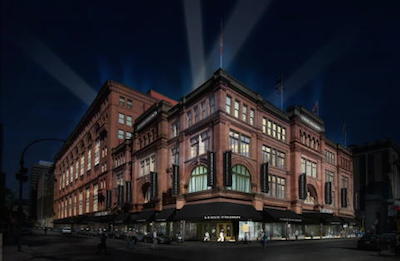While many believe that ultra-wealthy consumers make real estate purchases based on desire and not practicality, a Wealth-X study shows that these high-net-worth individuals make decisions based on practical, emotional and financial factors.
The Global Property Handbook from Warburg Realty and Barnes International Realty ranks London as the most desirable city based on factors within the practical, emotional and financial categories, followed by New York and Japan. 10 percent of individuals with a net worth of $30 million or more own at least five properties.
“The report finds that ultra-wealthy buyers mainly weigh their real estate purchasing decisions on three factors – practical, emotional, financial,” said Clelia Peters, president of Warburg Realty. "For them, real estate is a living asset, which sits at the intersection of the head and the heart.
“To reflect this, we have created the first-of-its-kind Alpha Cities Index to rank the top 50 most desirable cities based on their needs in these 3 categories. London is at the top, followed by #2 New York, #3 Tokyo, #4 Sydney, and #5 Paris,” she said.
Heart vs. head
After prices fell in the beginning of last year, the report showed that only properties who have a balance of optimum factors within practical, emotional, and financial have continued to grow in value.

Hudson's Bay Montreal
Research has showed that even though high net worth individuals have a substantial amount of funds to spend on real estate, they still make decisions based on practicality. For instance, most affluent businessmen prefer to live in close proximity to where they work.
Another major factor in purchasing real estate is the proximity to younger family members who are attending school. For instance, grandparents would like to live closer to their family by where the children are attending school and parents often buy real estate close to where their child may be in college.
More insight shows that more than 67 percent of high-net-worth individuals have self-made fortunes.
 Knight Frank Hong Kong real estate listing
Knight Frank Hong Kong real estate listing
Easy connection to other destinations is another major decision maker for individuals purchasing property.
Added insight
The Greater Toronto Area saw the sharpest growth in luxury real estate among the major metropolitan Canadian market in 2016, with sales of homes at $1 million or more rising 77 percent.
According to Sotheby’s International Realty Canada’s “2016 Year End Top-Tier Real Estate Report,” for the second year in a row, Toronto had the greatest sales gains of the four metropolitan markets studied. All of the cities in Sotheby’s report performed well despite challenges such as Brexit and national policy implementations, as local conditions lessened the effects of broader changes (see more).
Despite the surprising outcome of June’s Brexit vote, London remains the world’s top city in a time when place equity matters more than ever.
Resonance’s “World’s Best City Brands 2017” report explores 100 cities, judging each locale on six categories to measure the perceived appeal of a place for residents, visitors and investors. As more and more content, commerce and communication shifts to the online space, sense of place and how individuals tap into the energy and excitement of a location will become intertwined with prosperity (see more).
“What’s interesting to me is that there has been a fantasy about the depth of the ultra-wealthy,” Ms. Peters said. “If you’re someone who has a network of $10 million, it wouldn’t be crazy if you owned a $5 million apartment.
“But if you’re someone who has $230 million, you won’t have half of your money in real estate,” she said. “There’s only so much the ultra-wealthy are willing to spend on additional residences.”
{"ct":"IfF8joVgiJKvtgQHsIGRNZ1oAYufCu+cBy0U06Qc85reLlt7sdcCjyNqUsu1A2ChM2x88PEG9QzYvfvSBJ\/4\/Jb4lgotcDLe9OopHvBhjEuQwscLr20taQh6y+bXB3nLoegruGsSQzynL1jzTLZJYAzOROVvZjgjZqFeNOlh8neCLCT8XQ4LATjmnYfZo0Ci5R\/IJEIZA6Ms+gIkSz5WGLNarso854zX+pOgG3b2kNwT6DfxdPw+J7Q\/N6I3TzB1XNS\/BdminVRxdnJ68vXBd06asOuzRB4hFqAZj15bAF7iyh5GlwFAIocQmHNmKPPq961mOOHUE8PCc6zcGg5o\/HT4t9TDJ7m1S0rtMGpDJ2+RSMjf64p1AS\/SpS19+Cmr+pQS8iRt0N38zQWq848XX9hxXjf9e2E4gvpZ8bRRSYwM6C\/Lg0+geRcvRx0GxG9kab\/ZncKQDdL\/IPAGFioZEsNvSRTir\/GH+Uz2dOCD+gfaq4yR1KF\/JnameNfjBcTKHiFfkAWyw8ujJqUTO+ZkZSwzBm0TwKnC+1dT7ajJIPTGj5CBu2oj8GAmIKFzGR15p0mi0wp2c3kNePSbYwx\/0fj\/3MPQi4RUUyMT7o2i51gcRD8QyQ8Q\/k58tsJLy1luuCMfFZ3ypG09jvWC45mPVI4MtbWHtmkC+08B+uzr+XN4j\/D21OYVJeGhQwE4ZgI+fMmhSWsHscDsAxZ5UAt0Z2DBzs4YbuzrdAS\/6jBHoNERA+zKanGioa0+PdwkS8FYkzekGleGUd0CSevLgLcgrdispUkGk1MAMWSi5v2r2B54bRtKRsrPKCp48QZgjH3f1oAE1hTERcrFz7jczCYKIp8ga41oB79SR0UAyrQv45JCTkXQMfvRtlDjvWQtsu9j1BlsnmamyIoCwa7JF7xXUwuRuX8uQgutj4yEeSAmtXCPhy9W73B1YUVjK8yEH+1JbSUjWXgCW1IN3Oq1\/ZAC9FTdeLgSfchyGP7vYRpm3Flgc1GiDkQ7sO0cFgJ5xx+pOq4VXeQml+mFAT4osCWdZkfvEAp0QNGM6Mds6BRLcKGtj9CWr6\/degTLYZTOL+fRUXHAeGMHAKf7NUJVyBI5ZkT7ExZTIBy9vdNngpLuafuoIHo1n14L2edNEYKzV1c0h7+XSB7pAgi8U9Merp\/DpWWDVBVRPNIdjqZ6nPyE9YmoQF96GJgIJVy7DgeuNyci3IMLj9a8d31V5DKEh0Q\/xcECmW5Bly\/EtdoEIJzqDxGWgzJYwLz8Xm8KnUL9L1GrXCxHpwW0mT1lPHOiW\/92yjxUBWcKuFYdOcB6uG+BTX37KbMkeYtvovK2HNMf9MnjZiHCWzd2fqXYtn2lZ+RAP7q7TiDzzL9JkIXIovfeFn2Xo5OY3K1gQ\/W1TtPa0Qb34v\/2EOUC64F+floLesmXLOZWYXpv10tD0hC9JdlwmhHodpFBB5h5nVUc4u5LjB9XEq+JGdJ0dXCzdROkkMCLEhsWKR7Uy7Z5al\/QOI8k\/U6Lt4G+BjdhgDKxqtefIihlgYnvIuWSaMPmPWbI6+bSfswrXB00O+FIOX0fxiC6VfqWvxHTD5Vmjx5A7gwKRVZvs6zZ+NmdHWOFfKV4LP3HdzA7J541hM0xDY6aZUk\/RGQozTx8TMS\/GHwVdmMZQmu6e587Zxr4eUbYikLyY\/qGZQGiD3FKUUXTKvsYGYYvsqcm43wWXrfSAbtUUHECLS42hUa9tGD6xCY06LswkrUYWxE+h7F5g23JECO+vLfjhyzAg\/PKlC7n1dgMbonTr4u9gnr8WLXxBV9g74YEuEnkn10kXSAxKpihkTaSo+9qSUnVkXP5wNYqeogvK8PzWZwyqwc7tJ2LsZ9D4gVCkiBlV8nYcVYh2XuwG4ZfrOc0Cr5duclv6BNUWBpwTF6DaQsAS9Crzt0Zax2QGwOPpzVCshHZC7+DOAuT6GuUQ+\/Sw+S+bHMCxYTEYJ1YovVm5QKlDo2iXBrTatFSqnW5h4AxWuB4H1FEPjyHJIU2YNnTKcY7\/j\/CZ+WI5cuuGOV2TriOYSLp+197sCkMXqExA5UOc73lWpfZYHi1enHhvdIn811n4Ohf9o6tKj0ctQtDZjkJ09vHIGqvT6axoTA1YhDCw9sva2gEQtpJWJGEqvmliZpU69K\/98dhRawJG6fyzT4ytv\/damSYGa7lhl3M\/acCJuguotyjnsuEwd0hdWqh7OaEA3flXUs0a6pfdEDOTIM6JSFZI84DuXZ4JDeF6+xiRFhUEOOVAxDokD7sXLJEZ45SFQTtpDIj23Vr2GSAukvzPm++cvKThnrpmo1QGQCsy8SNyMxQymVSX\/ntVWj3gHY4E2yDWjNFYMz6tqG0Hf8dV3TYPpV4rC2Ju0BgHWi33KSu9Y0mLNPlCe5cjZz6O1bV4HX+zZj6i5OuUAoy8AMWZqFyzq6m\/O4Uv5EmDaSTbXAWG8qZ+DCvdFmiyxXVzXXeeekD5C8vB6wD\/np8JMTlQB++E3pKq87G2\/7DCmVguth7aj\/4QxiWaJIfN3NvmZwdQD5OfS7fsJFSB9gl+gNzV3E392Cl\/DhkWAk1aLwCRQBdoXeke50YRCpiutXmZ2QbQkudGLsVqYJ+5\/uPRhqX1MaxXm0SNfR8dqmzg68paoDay1tb3rt+4+V4LEBRqWVLgVgT5JiBISqRMsMoWY1wTogQ1tWACBRtuIWRWQ4z9yagBnm8TITtlus0upzV8FmNF5LPBrcLGXgVinIzF\/jo\/wKw\/qIdY\/l0o+qFQCC8FOPaoSxW9+y+W9015wtc5GgIANEFvDpmzlHKXTLg3DN3Qdubd1cWAT1B+zF7POr42mCcrz3qMp\/CmOdyjqh6XVYsGT6CAisaO9QgqPk3Cv09FIQEBt+dEdGeibqgHG0Hqh5fmQJhDCXVbHLx4T0IB\/Bsge3buZe9jhXvvcFDPFHxdcedfYGH54PM3VBHpuxpR9SwI9er6GyH+MmUYy+LXKm\/pL9b+lNf+4\/8qou0OmKwYCEg2JTEK5VLFbdZlqzUY+vogjUKPzv9KX940EjGU5HpXGC7CRvQwq\/nLbIPz++ejkQCUmZ\/CQbPLBAHO176A7EIbimU+urvCgTW2CPKF7GB1zHRsj58DbJnyXjFjIg+tKcFNnv\/kQ6tuUZPbbRz3wjdKPJY\/LhqGuy7kMHnnL8dxKuXniVhtY4JxvTpc0DJfw\/\/1NXBkzptg23Ip3tBOraIJ0rglJwEdEvt2uEdF7kUqApYJlTUnUSbivBNsVhGBSmgneKdjh47Bunud449F7H+Th6qd45WBtAgQgjsxWAvM0lBn\/CdmqeSwxLTdsHPB2PzwDjbVQ5+eh+pffoSewNUA+GBVMuMuW948elbY451YeB9ljQFXU+2XFX4ioGTIlz8nigWvxIjZE+nUfgwH0nRvgh5N6W5PMean4YeavNMLIaNRfJjC+7TehFjKBvUPfxHV7u6an9YyccdYib4Hy4GVX4M02fiNJa9TYj3GzCFCIsKHv\/pOVbFA1IyXqoZQRzq0SFFOrW3ZPlOKhdYqYPmpYEdBk5sT8MWF9knJ800WzblQSdq61N4MA8Pu4QIzoeXf0Km4v81shmOvcHXhtAiyYr25Iv49+BhsUppRqvTxp9Sapi0gvMc83lNbLkx8i+HnhajASF4sTnhslZ7aezpFLRH7WNNzV6gRF4mGeu2bI4bNBT52yKSfPCLZ2UpOGWxKXv\/PsaGoJX0SBvcdE7EJl77bQdnUQAuZgWma2O34w2NtdknjKwZV6CBtsI6PKtykSZq3PjfNY1UpcqGStpttXKU4ZqVXMd2sS786EgYBRxZU+AE6AlKi4+18WlG80dCjRjr51Pewv4JcQnaJRwImH6E+S6+MTWxcfxfnXLhO19\/+I7LwePYBodxABHJ+5sSclz7ABChbUuY58TnCDGW+vIXbuXewSdV6IhGR3YMZMd17+6GIUxGYr3ExatFwiBvVUjKYrFQa\/gxGG1gkJ3xarE2ywYeqWfUbUoIIGNqIS7wzhbULVUkHkFZF6wVlHn4+KUD++EjmaJaMNmlwzNWZWlCoIUoxrBmgySZIymJ2BWIBAbLj\/HR3BtwVmh8e7IweHeD2tCUoDd60ynHF\/VAnrBD2EUR9XKDR9cuaZ56\/Wpbu8s6EE5CfiHDXGcYoI8XIxV0f1Osr41FswzLO1P377s8Y7hi0grH3+ZPPaBLxi0vWqhtu6ytsZT8xWDkjRslTCvpgNj9OB45WxOt8\/7+RGDxMjkGgbfhsDyL7XOCZlP7V2wnq2fIWQ1ulxzTyFt0JcYSFEkvgsllhzkG1AOeCn+rhNcHQ4zqkCvUsJY\/xkNGOee3P9kW7RAsSig3iu3ua\/ZgWmYCWheVjsnMNOpew1\/Y0hxYwMsTT0flPxLY0aK51gIbANJXdyxLyKKjByWoAucZ27oGWE\/6FJPGtOujnoBxxrkrQTzavlWaA19qdUyQ08Q6usN5whVIv3T6AHEFldXrIVWv2WrlidNNO1uhdR84ka0v7AlhVZBI\/0rBOO+Zt81JIyUhRB891mCUf2YehJAnYpp0nCW4MhtSphiPkeeyHNtnIhda4QSyDN6+d1YfyVnFK2hNtIy0688YQEX5U+mKbSRQqrqwVMAgbZuVsETuUfYP\/miNzK+XglWPC+5vrPm1qHLiLktERezqkB9eQX7OAeim8Mhw4Hef+PvrTU3uMV4VXtRL\/P9\/uzd0lN4ixttvckuFwJpXXqb72kT0T4\/sTIWYxJ6BrioHF13NZBqn5DZl5lMx\/ktVTs6TVKC2i6kJo6UgJ4Wo6+vjfFjYA9c1kt+cWPzSZfl+iL3i2kE3REbF1Ze\/KDo4aG0\/YIEDcQY7nuJL8R4x4s4xDJN13i3M9sSBT7WylCtIbFpbz2XKahumFUWo9eU2DhvAvZBlE8bYgR8ofP4yziqEY5uQUjvZhvXps3lUBVWfecLauoAyiLw+Uq3h8tIKEGjsDfmbyvIbwEsw+9ZnE2m2xGKxbHuvWf2mWNY2jhqxPA3HrQofDvgyzjMWyNYfusuProlHQP5bzjWBmqmrd3lDE\/pBEnuYlNppaEcFZrm9i2qU6OM8FoRnDbxd6HKUYFDMG4KpuFFJyIzAQ8+1g9F1EjIjZgRWmxs5WdSVIwY+QMUwvZjYIMBklxCiEFbtqj4\/FGrghZgdPFJmEhGWqsFG2q6jtqaFYJ9b2jVxeC\/TvAs9Y\/ckuVlB8vDRPnrCgDQqGXVslfGMG9QbnwC+SMr0OHR0OBJ7Zm94NUmhxCvU3VfBHqnsT5rMhGWC5qkQ2JyjANzwS\/bdgljGrZEZbeP2Pu44Nel8JXhubaAhe\/QsYeSujHwuLprs6+rLnA+xllGPm522F6DvGbtCoAT7CkA27R0ZRh6XPSjbmn+gu0ZC05Ukgc14rYqHX\/XCPlTsSs3v53LIKBk8xoNDVcvRkBWEQmO6vLKfvjPSPbffUjmzNXgscGKr3VHwvAY7RZW3uu9ctNs\/jFeBQyisNOyylAm80uCn8DUzWtXPYlXyr\/RMhVRhgnbzgY32VQ93u5bV7d7d3OQvoinT18gN5ZyUns\/R5XF6bkcWucPfjexHidOjOgY0WKMml+ozlhXg9UJTrt2H9kUIz+D6zA6Z+hwx9unjeC8y8hqXPhBPpm6oiOi4XbRP36bdIUAlzM4qxBL9PIjd+qv6XDmdvLkk1okU6+tFVvyKxwsKuF7rDDLxyeJkUF3c0yVcuN\/+xeHhz9BUChxjzwNAhGAl9R02nIxmA6xVrX+lg\/e2QsZE1sFHiTPLvwLF6j5jQ4kn86SCoTzJjfe5XQO60qGc7TDvWqFeri+N+8gXrSWsVhov6vQ665oRfrAOP9lVXvQooJnYDXMjNsENoKjJglUah3F7PGkTnBE\/llls773BYLEYgBHFGeUI9d9cA6dBiCFgi04ZhidWy\/xmdmNqkea0YeiVnc1GigPArPpmKzK4tN\/HFnJxnw1cLI1yusTzZN\/\/\/6hGvVPGePp3vACuO8x61CnlJRWLVB69Ct1m3SQvrqxxtKzAs9rusZCXbmsquCcu7NtvjHI4bn8K6t0+1PS9EGG9KrmbX\/xLa9dS2kPip2btvIAsltcvZqqrSx2FHOZIF2zym9liHinG3NbzE0e+ivoqSXqLbFeg7khc4RE4+fn8\/DrJGa0tcSAV7RRxpmF\/5vIPKzts1qSpKeMLuXn4vJ\/sJ0TPn0vGce641XTbyJ113kUg\/l8hnuG8WPBT23w\/M\/qhZDBP3Lg\/8n8+6UrJ0Ql5wBPuBAaYngFWbonD7XG1Ry7Kvo5UTF48bQWZCfTCulEBg\/lKQHr+C9vQm9dxMZzObgJwVj\/F1JkqGz5kYFSYGhhWJ1TLnFbrAjn1tYcHDLpc0Ye7HrUBE4Zorr8pUVT18uOKdiH+9C7V3tFTpvNxiYEr\/bKYMwECp76nW4PPOr8ZLbF2dnIUQd0jj1tVUJBQHezI3ShVJWJKIaZ5uVddWSxm4smqHPWVqo9gnLGG+lmBhW+Xo6RLNzr92JC53Swy9ZboY56UQTZAqNQiCG+fIFMhVirsgJHLVwoiEQNvUqK5X\/UYO9FM\/DVM4TF5XrZSf75eU8gbDZPxEvhgY6xoB6k8L3eVmGtH65hrwSJaM54xK6hG40wYw6dJGd2YuSKBA\/PPUmWvz+1NQFkZAxkCDPa47y\/\/I7dzylDjkyYrQINmVY0ev1lKsJqlP6JkqJ3R+pSwB2vQVzl94Ay0PFM3rmfKbX\/3\/KHyXYaajAEz\/GJP11dnfQ1LJ0dNcoiyxbvuz6mha33apn4wdri+xH\/55j0459Ob5aNAdxfC6O+t\/RhGWU\/TMCio1owp1L4szqF1KT5Wa34K+ClbfP8vfhfNiRo8MXyZgRp2Mtgp3+nXLsS0H\/ner3J8s7cRb3A3ZfgspYUlB5dLpmP6psAsmTYesdYsNzX9hK3RYhdC8kW6yeYh1Y\/9weeIDrR5iPbgm6\/Z+DjDWrlZ05\/gu6xmqq5xPQogsm5mOWJeTtI\/HeFwFXhlMm++83r2kGXBfxcN3wYzFuPaGTsxHUhG8VMtOUsJVSzcVocPcIhWqAXWQ1dN2X6PHQ8nZvY5IzzvPqLIG4dOoIkNFK+B5YoFE248buCYWz89V+yObbf\/L5Kqp\/EOaW4ODa2s\/k6F1xkE9LkW\/OeOihvpSB5F9x7E+uUyl+VF2dpj8b2CwGAkwpeCEmtzzZv9pV+LldqCFx6DvqWg91onRFO9Xpc9A5FS0Y2HgZKVxr2h0BAhbXoZZltN5su+RUr\/Zn3Vgjy7vcGjJ1Pnu1xCdEx1Fmpq","iv":"00fde62fb07ec11a9fb8e51062c6fa87","s":"0c235052bd9d89dc"}

 Property listed by Sotheby's Realty in Toronto
Property listed by Sotheby's Realty in Toronto
 Knight Frank Hong Kong real estate listing
Knight Frank Hong Kong real estate listing